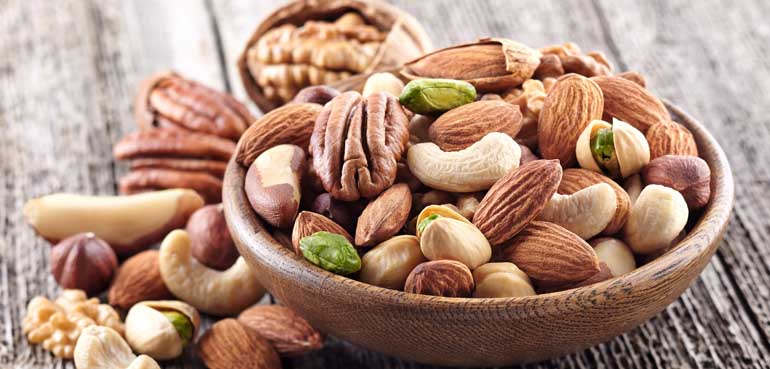By Kristen Castillo
Nuts can be a healthy part of your diet. Rich in protein, fiber and healthy fats, nuts are also cholesterol and sodium free. Plus they have a low glycemic index, making them diabetes-friendly. They’re a potential lifesaver too!
A Harvard study of 120,000 people over a 30 year period found that eating nuts can keep you healthy and might even help you live longer. The report, which was published in The New England Journal of Medicine, found that “daily nut-eaters were less likely to die of cancer, heart disease, and respiratory disease. Overall, the daily nut-eaters were 20 percent less likely to have died during the course of the study than those who avoided nuts.” One of the Harvard researchers suggests eating unsalted mixed nuts. She also advises using nut butter on toast instead of butter or cream cheese, adding chopped nuts to yogurt, serving nuts in a salad or stir-fry, and eating entrées like nut-encrusted fish or chicken.By definition, a nut is a seed and a hard shell. Nuts grow in trees, like almonds and walnuts, hence the name “tree nuts.” Despite their name, peanuts are considered legumes, since they grow in a pod instead of a shell. Still peanuts are a great source of nutrition, containing protein, folate and fiber.
Overall nuts have many dietary benefits, and since no nut is nutritionally superior to another, choose to munch on your favorite, including walnuts, pecans, pistachios, almonds, cashews and macadamias.
- Daily walnut consumption may help your heart. Multiple studies conducted over the past 20 years link walnut consumption with lowering LDL cholesterol levels, a predictor of cardiovascular disease risk. A one ounce serving of about 12 to 14 walnut halves is 190 calories.
- Eating pecans is linked to a healthy mind. Animal studies conducted at the Center for Cellular Neurobiology at the University of Massachusetts Lowell and published in Current Topics in Nutraceutical Research indicate the nuts can delay the progression of age-related motor neuron degradation, such as in diseases like Lou Gehrig’s disease. Pecans are also rich in vitamin E, which can help the body fight diseases including heart disease, cancer and Parkinson’s. Pecans may keep you trim, too. A report in the American Journal of Clinical Nutrition says the nut “may increase metabolic rates and enhance satiety.” Twenty pecans make up a one-ounce serving, totaling 200 calories.
- Pistachios are a great source of protein fiber and vitamins. One serving of pistachios (about 49 nuts) has 160 calories and as much potassium as a half of a banana.
- Almond-eaters have lots of energy. A one-ounce serving (about 23 almonds) is 170 calories and provides magnesium 12 vitamins and minerals, including riboflavin and vitamin E, 13 “good” fats, and six grams of protein. Almonds can be eaten whole or slivered for use in salads and yogurt, as well as in almond milk, almond oil and almond butter.
- Cashews are packed with copper, magnesium, phosphorous, zinc and iron. A one-ounce serving, about 18 kernels, has just 160 calories.
- Macadamia nuts, typically sourced from Australia or Hawaii, are often used for baked goods or snacks. A one-ounce serving is between 10 to 12 nuts and tallies 200 calories. Macadamias are high is manganese, thiamin, vitamin B6 and phosphorus.
While nuts tend to be high in fat, it’s a nutritious fat. Stick to small portions (like the ounce sized mentioned above) and you’ll reap healthy and tasty benefits.

